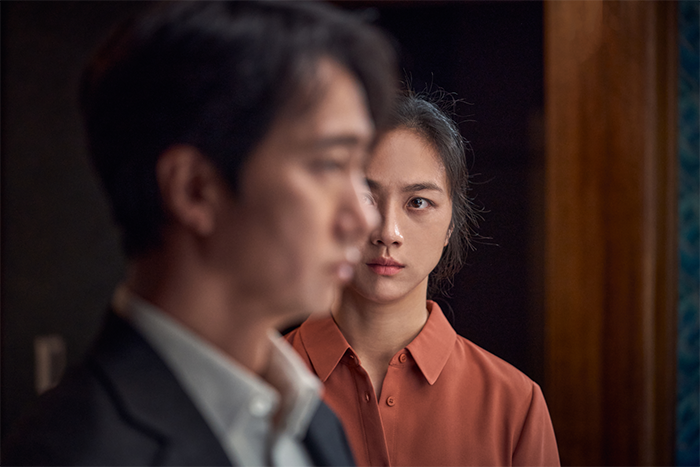The mind of Park Chan-wook is a curious and enigmatic place to spend two hours. The maker of The Handmaiden, Lady Vengeance, Thirst, Snowpiercer and Oldboy specializes in psychological distress punctuated by dazzlingly staged shards of violence. Notoriously tricky to synopsize and impossible to forget, Park’s exactingly constructed melodramas challenge audiences to catch up to his pessimistic assumptions about human nature—but in any case, to be dazzled by his daring visions.
Park’s latest, Decision to Leave, may be his most compelling work yet—faintly disturbing, extremely sensuous, elliptically plotted and elegant. A splendidly splintered Korean police story, one of the most captivating yet elusive films you’ll see this year.
Detective Hae-joon (Park Hae-il from The Host and Memories of Murder) is already a bit compromised when we first meet him. An insomniac given to strange impulses, Hae-joon is a habitual daydreamer with a tenuous home life and a hyperactive imagination. Now, faced with the suspicious death of a man who apparently fell from a mountaintop with no witnesses, Hae-joon is left groping for clues.
Complicating the investigation is the dead man’s widow, a beautiful Chinese immigrant named Seo-rae (Tang Wei from Ang Lee’s Lust, Caution), who exhibits neither much grief nor even much apparent interest in the details of her husband’s death. She definitely seems capable of mayhem, although under questioning it comes out that she can’t stand the smell of blood.
Then there are the scratches—both the victim and his wife have each other’s DNA embedded under their fingernails, and a scratch mark is clearly visible on Seo-rae’s arm. The detective is intrigued, and his initial casual attraction to the widow slowly turns into an overpowering obsession.
The whodunit—directed by Park Chan-wook from a screenplay by his frequent collaborator Jeong Seo-kyeong—gets very complicated very quickly, mostly due to the constant distractions caused by the detective’s interior competing suppositions. Hae-joon’s stream of consciousness overflows its banks. Real-time action is intercut with odd film clips, fantasy re-enactments, erotic dreams, flashbacks, etc. Fentanyl emerges as a credible murder weapon, and the ubiquitous mobile phones are traps.
Among other red herrings: a comical bit about soft-shelled turtle juice as a cure for middle-aged depression, Seo-rae’s endless apologies for her faulty command of the Korean language and the case of a femme fatale named Oh Ga-in and her jealous knife-wielding boyfriend. Suspicions get ramped up further when the Korean cops learn that Seo-rae is wanted in China for murdering her mother. And so on and so forth. Despite his wife’s (Jung Yi-seo) and his police partner’s (Go Kyung-pyo) protestations, Hae-joon compulsively investigates his own mental state as carefully as he does the widow’s shaky alibis. He’s in deep and sinking fast.
Filmmaker Park packs his films with bravura “throwaway” visual riffs, gems of kinetic frenzy, on which many directors would love to build an entire movie. Except that in this case, each “throwaway” subplot is a window into the obsessed detective’s hectic frame of mind. Cars swerve and suddenly crash and punches fly in like raindrops. After seeing Decision to Leave, you may very well want to revisit it, not to refresh the plot logic but to admire the structure, the unforgettable set pieces, the tangled romance between the distracted policeperson and his ultimately unfathomable suspect.
Actors Park Hae-il and Tang Wei perform a tantalizing “dance” with each other as their characters bob and weave through the police procedures. Detective Hae-joon’s onscreen hallucinations naturally cast major doubt about his case against Seo-rae, but then Decision to Leave is nobody’s idea of a standard-brand whodunit. The two main characters are ghostly, almost impressions, as if they were created by a 3-D printer. All we know is that there are no innocent parties. That is as it should be. At one point, the frustrated detective remarks to his partner: “You don’t know the bitterness of life.” Director Park Chan-wook obviously does.
In theaters














